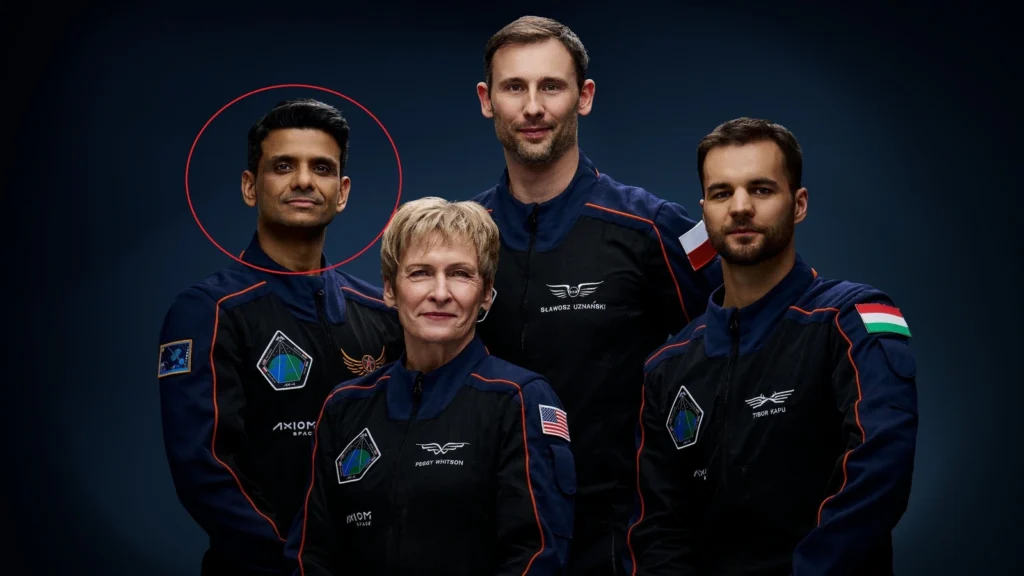
India’s Hero Returns: Shubhanshu Shukla and the Axiom-4 Crew Conclude Historic ISS Mission
Updated: July 14, 2025 | By Express Web Desk
In a defining moment for India’s space exploration journey, Group Captain Shubhanshu Shukla, India’s second astronaut in space and the first to visit the International Space Station (ISS), is set to return to Earth along with the Axiom-4 crew. The spacecraft, a SpaceX Crew Dragon, successfully undocked from the ISS on July 14 at 4:35 PM IST and is scheduled to splash down in the Pacific Ocean off the coast of California at approximately 3:00 PM IST on July 15.
🚀 Mission Update: Undocking from ISS
The Axiom-4 crew, including Shukla, boarded the Crew Dragon spacecraft early Monday morning. The hatch was closed at around 2:25 PM IST, officially ending their tenure aboard the ISS. By 4:30 PM IST, the spacecraft detached from the Harmony module, initiating its slow departure from the orbiting station.
Ten minutes later, the “Depart 1 Burn” was successfully executed, which gently propelled the spacecraft away from the ISS at a speed of 1.25 m/s. This burn initiated the spacecraft’s journey toward Earth’s atmosphere. The splashdown process includes multiple deorbit burns and parachute deployments for a soft ocean landing.
🌍 Splashdown Timing and Safety Window
According to the Union Minister of Science & Technology, Dr. Jitendra Singh, the scheduled splashdown will take place around 3:00 PM IST on July 15, with a margin window of approximately ±1 hour, depending on weather and sea conditions off the coast of Southern California.
🔬 Scientific Milestones: India’s Experiments in Space
One of the major highlights of the Axiom-4 mission has been its focus on space-based scientific experiments, several of which are designed to benefit India’s upcoming Gaganyaan human spaceflight program. With support from ISRO, Shukla conducted seven critical microgravity experiments, including:
- Tardigrades Study
Investigating the survivability, reproduction, and genetic changes of water bears (tardigrades) in microgravity to understand life-support sustainability. - Myogenesis Experiment
Research on muscle-cell growth using precursor cells and flavonoids to evaluate muscle regeneration under zero-gravity conditions. - Seed Germination
Observation of methi (fenugreek) and moong (green gram) seed sprouting in space to study biomass potential and nutrient availability. - Cyanobacteria Centrifugation
Studying two different strains of photosynthetic cyanobacteria to evaluate oxygen and biofuel production in space, which are vital for long-term missions.
5–7. Microalgae Experiments & Bone Studies
Investigations into how microalgae can contribute to food, fuel, and oxygen generation in space, along with radiation and bone-density impact assessments.
As of July 12, four out of the seven experiments were already completed and prepared for return. The remaining three experiments were still under final observation during the journey home.
🗣️ Shubhanshu Shukla’s Farewell Message
In an emotional and patriotic address recorded aboard the ISS, Shukla paid tribute to India’s legacy in space:
“41 years ago, an Indian came to space and told us how India looks from up above. Today’s India looks ambitious from space, today’s India looks fearless, today’s India looks confident, today’s India looks full of pride… today’s India still looks ‘saare jahan se acha’.”
His message reflected both national pride and the beginning of a bold new chapter in Indian spaceflight.
👨🚀 The Axiom-4 International Crew
The Axiom-4 mission has been notable not only for its scientific output but also for its international team of astronauts:
- Peggy Whitson (USA) – Commander and former NASA astronaut with the most cumulative time in space by any American.
- Group Captain Shubhanshu Shukla (India) – Pilot and former Indian Air Force officer representing ISRO.
- Sławosz Uznański (Poland) – Mission specialist and first Polish astronaut to visit the ISS.
- Tibor Kapu (Hungary) – Mission specialist, marking Hungary’s re-entry into human spaceflight after decades.
This mission marks the first government-sponsored space mission for India, Poland, and Hungary to the ISS in over 40 years.
🇮🇳 India’s Leap into the Future of Spaceflight
- Historic First: Shubhanshu Shukla is now India’s first astronaut to stay aboard the ISS, following the legacy of Rakesh Sharma, who flew aboard a Soviet mission in 1984.
- Scientific Contributions to Gaganyaan: The data collected during Axiom-4 will significantly support India’s Gaganyaan mission, expected to launch between 2026–2027.
- Global Partnerships: The mission was a result of collaboration between Axiom Space, SpaceX, NASA, and ISRO, showcasing the power of international cooperation.







